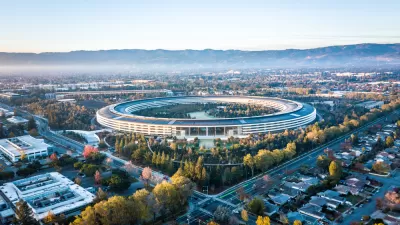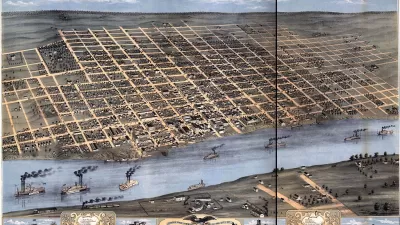Why are Google, Apple, Nokia, and Microsoft funneling significant resources into creating the best digital maps? "[A]ll share the same hunch that maps sit at the core of our digital future," writes Farhad Manjoo.
"Mapping is a thankless endeavor," says Manjoo, and for the time being it's a largely money-losing endeavor at that. So why are the world's biggest technology companies duking it out to be the first name when it comes to mapping?
"We think there have been three big shifts in what people were asking online," says Hans Peter Brondmo, Nokia's head of new product innovation. "The first was 'what'--Google won that battle. The second question was 'who,' and Facebook won that. The next big question is 'where,' and that's what we're fighting to become, the Where company."
And while it remains unclear exactly how these companies plan to monetize their investment in maps and place-based imagery, Manjoo says that they'll "keep pouring money into cartography because of its inherent, unknowable promise."
"Inevitably, though perhaps not anytime soon, any successful effort to wring big money from mobile devices seems likely to depend on knowing exactly where users are and where they want to go. Mapping requires, and creates, huge troves of user data. The bet is that the data will lead to insights into user behavior that can then be turned in to new products. Or, failing that, to methods for predicting customer actions in order to serve up better ads. 'We think there's a lot of potential,' says Matthew Quinlan, Bing's maps chief, echoing his peers' feelings. 'Future potential.'"
FULL STORY: Google, Apple, Nokia, And The Quest For The Perfect Map

Planetizen Federal Action Tracker
A weekly monitor of how Trump’s orders and actions are impacting planners and planning in America.

Congressman Proposes Bill to Rename DC Metro “Trump Train”
The Make Autorail Great Again Act would withhold federal funding to the system until the Washington Metropolitan Area Transit Authority (WMATA), rebrands as the Washington Metropolitan Authority for Greater Access (WMAGA).

The Simple Legislative Tool Transforming Vacant Downtowns
In California, Michigan and Georgia, an easy win is bringing dollars — and delight — back to city centers.

The States Losing Rural Delivery Rooms at an Alarming Pace
In some states, as few as 9% of rural hospitals still deliver babies. As a result, rising pre-term births, no adequate pre-term care and "harrowing" close calls are a growing reality.

The Small South Asian Republic Going all in on EVs
Thanks to one simple policy change less than five years ago, 65% of new cars in this Himalayan country are now electric.

DC Backpedals on Bike Lane Protection, Swaps Barriers for Paint
Citing aesthetic concerns, the city is removing the concrete barriers and flexposts that once separated Arizona Avenue cyclists from motor vehicles.
Urban Design for Planners 1: Software Tools
This six-course series explores essential urban design concepts using open source software and equips planners with the tools they need to participate fully in the urban design process.
Planning for Universal Design
Learn the tools for implementing Universal Design in planning regulations.
Smith Gee Studio
City of Charlotte
City of Camden Redevelopment Agency
City of Astoria
Transportation Research & Education Center (TREC) at Portland State University
US High Speed Rail Association
City of Camden Redevelopment Agency
Municipality of Princeton (NJ)





























